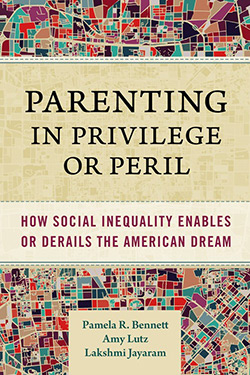Parenting in Privilege or Peril: How Social Inequality Enables or Derails the American Dream
Amy Lutz
Teachers College Press, October 2021

Amy Lutz, associate professor of sociology at the Maxwell School, is the co-author of a new book, "Parenting in Privilege or Peril: How Social Inequality Enables or Derails the American Dream" (Teachers College Press, 2021).
The book examines how social contexts and culture affect parenting decisions. Lutz cowrote it with Pamela R. Bennett, associate professor in the School of Public Policy at the University of Maryland, Baltimore County (UMBC) and Lakshmi Jayaram, president of the Inquiry Research Group LLC and affiliate with the University of Central Florida.
The authors analyze class differences in parents’ social contexts—neighborhoods, schools and networks. They demonstrate that cultural differences are no match for economic inequalities. They find that middle-class parents, whose financial resources give them access to social contexts that are generally characterized by security, engage in “strategic parenting,” which provides them with various options to help their children go off to college. Whereas working-class parents’ contexts are generally characterized by precarity, leading them to adopt “defensive parenting,” which largely consists of using harm-mitigating interventions to keep their children safe while helping them succeed in school. The authors call for a public policy shift away from trying to change how working-class parents raise their children toward improving their social contexts.
Lutz’s research focuses on race and ethnicity, immigration, bilingualism, and educational inequality. She earned a Ph.D. at the University of Albany, State University of New York in 2002.
From the Publisher
Is the American dream that exists for the middle class equally available to the working class? Using extensive interviews with parents and a variety of data sources, this book examines how social contexts and culture affect parenting decisions. By analyzing class differences in neighborhoods, schools, and networks, as well as their relationship to mobility-related parenting practices, the authors demonstrate that cultural differences are no match for economic inequalities. They show how middle-class parents have access to social contexts characterized by security, which gives rise to what the authors call “strategic parenting”— a set of practices that allow adolescents to develop the qualities and skills they will use to go off to college and, subsequently, achieve the American dream. Conversely, the contexts of working-class parents are characterized by precarity, giving rise to “defensive parenting”—an almost frantic use of harm-mitigating interventions to protect adolescents from threats to both their well-being and prospects for mobility. This important book calls for a shift in public policy away from trying to change working-class parents to improving the social contexts in which society asks them to raise the next generation.
Related News
Research

Mar 6, 2025
Research

Jan 28, 2025
Research

Jan 27, 2025